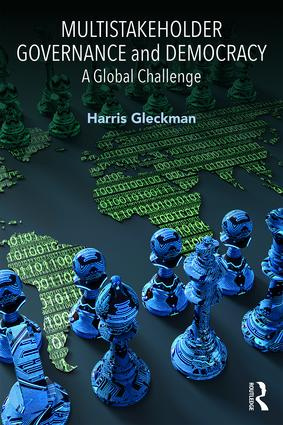This book examines the challenges presented to multilateralism and democracy by the further development of multistakeholderism. From a theoretical, historical perspective it describes briefly how the debate on global governance evolved and what working principles of multilateralism are under threat from multistakeholder governance. From a sociological perspective, the book identifies a series of organizational beliefs shared by participants in multistakeholder groups and the likely change in the roles that leaders in government, civil society, and the private sector will face as they evolve into potential global governors. From a practical perspective, the book addresses the governance issues which organizations and individuals should assess before deciding to participate in or support a particular multistakeholder group. The practical chapters are based around sets of key issues and questions with case study examples used throughout the book.

 An invaluable and comprehensive analysis of contemporary challenges to multilateralism as the organizing principle for global governance. With piercing precision Gleckman identifies gaps and limitations in governance and questions the illusion of democracy and participation. The book offers a welcome and thoughtful guide for improving decisionmaking and assuming responsibility in a context of distributed power.
An invaluable and comprehensive analysis of contemporary challenges to multilateralism as the organizing principle for global governance. With piercing precision Gleckman identifies gaps and limitations in governance and questions the illusion of democracy and participation. The book offers a welcome and thoughtful guide for improving decisionmaking and assuming responsibility in a context of distributed power.
- Maria Ivanova, Associate Professor of Global Governance, University of Massachusetts Boston, USA
 The understanding of how the management of global and regional transborder issues and problems are addressed has evolved considerably over the past decade. No longer an exclusive preserve of diplomats and international lawyers focussing on formal institutional arrangements and legal instruments, the scope has widened to encompass a rapidly growing set of issue areas and multitude of new actors from civil society and the corporate world. Harris Gleckman’s book is a significant contribution in mapping the evolution from hierarchical legal exegesis and intergovernmental power play towards more supple horizontal relations between a diverse and expanding set of stakeholders. The author does this with the rare combination of the clarity of the sharp analyst and the insights of a seasoned participant in these processes. His book is essential reading for anyone involved in the changing patterns of global governance.
The understanding of how the management of global and regional transborder issues and problems are addressed has evolved considerably over the past decade. No longer an exclusive preserve of diplomats and international lawyers focussing on formal institutional arrangements and legal instruments, the scope has widened to encompass a rapidly growing set of issue areas and multitude of new actors from civil society and the corporate world. Harris Gleckman’s book is a significant contribution in mapping the evolution from hierarchical legal exegesis and intergovernmental power play towards more supple horizontal relations between a diverse and expanding set of stakeholders. The author does this with the rare combination of the clarity of the sharp analyst and the insights of a seasoned participant in these processes. His book is essential reading for anyone involved in the changing patterns of global governance. 
- Peter Hansen, former Executive Director of the Commission on Global Governance and Under-Secretary-General for Humanitarian Affairs
 Dr. Gleckman has written the definitive critique of the current "non-system" of international global governance, and of the emergent multistakeholder groups seeking to fill the gaps in the former. Gleckman then ventures beyond analysis to propose criteria essential for any just, inclusive, accountable and effective institutions that would address global crises. This volume is addressed to all intelligent and ethical people concerned about global problems and committed to the quality of their resolution.
Dr. Gleckman has written the definitive critique of the current "non-system" of international global governance, and of the emergent multistakeholder groups seeking to fill the gaps in the former. Gleckman then ventures beyond analysis to propose criteria essential for any just, inclusive, accountable and effective institutions that would address global crises. This volume is addressed to all intelligent and ethical people concerned about global problems and committed to the quality of their resolution.
- Jo Marie Griesgraber, Executive Director, New Rules for Global Finance, USA
 Buy the book here
Buy the book here